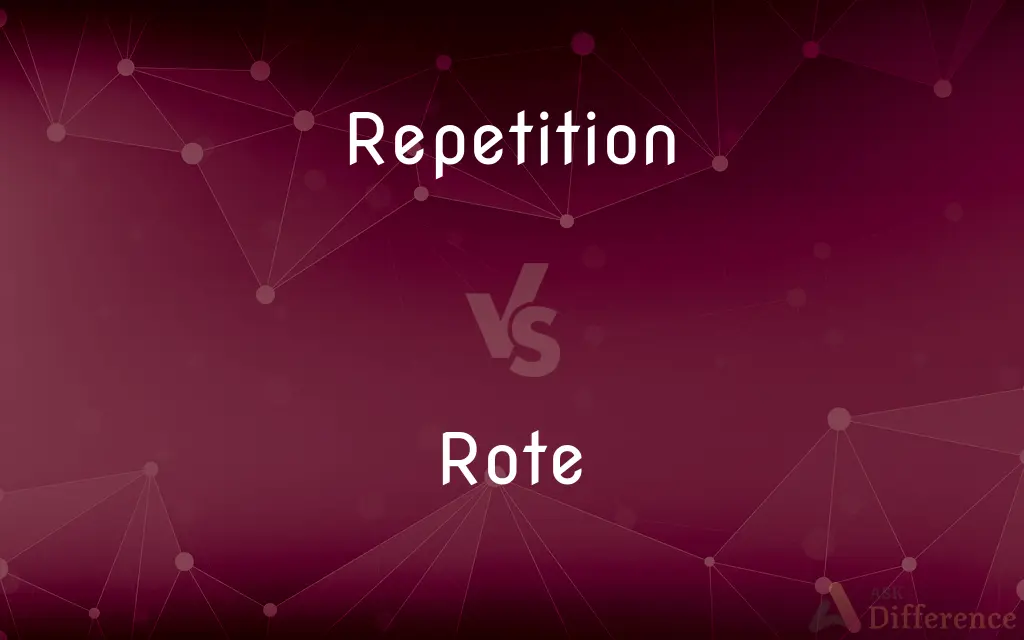Repetition vs. Rote — What's the Difference?
By Fiza Rafique & Urooj Arif — Updated on April 27, 2024
Repetition involves practicing a skill to improve, focusing on mastering the technique, while rote memorization entails memorizing information through continuous repetition without understanding.

Difference Between Repetition and Rote
Table of Contents
ADVERTISEMENT
Key Differences
Repetition is a method used primarily to enhance skill or knowledge retention through repeated practice or exposure, making it crucial for skill acquisition in fields like sports or music. Whereas rote memorization is often used when learning factual data or fixed sequences, such as multiplication tables or historical dates, where deep understanding is not the primary goal.
Repetition encourages the embedding of procedures into long-term memory, promoting automaticity in tasks such as driving or playing an instrument. On the other hand, rote memorization targets the recall of information by repeated exposure to the same content, useful in situations where quick recall is necessary, like exams.
In repetition, the context can vary with each iteration, which helps in applying knowledge or skills in different situations. Rote memorization, however, typically involves repeating the exact same information in the same way, limiting the ability to apply knowledge flexibly.
Repetition can be engaging and interactive, adapting to the learner’s progress and understanding. In contrast, rote learning is often passive and can be monotonous, with a higher risk of disengagement among learners.
The effectiveness of repetition is seen in its capacity to consolidate skills and adaptability, fostering critical thinking and problem-solving abilities. Rote memorization, while effective for immediate recall, may not contribute significantly to a deeper understanding or ability to apply knowledge creatively.
ADVERTISEMENT
Comparison Chart
Focus
Skill mastery, technique improvement
Memorization of information without understanding
Application
Broad (skills, problem-solving)
Narrow (facts, sequences)
Context Variation
High (different scenarios)
Low (same information repeated)
Engagement Level
Interactive and adaptive
Often passive and monotonous
Contribution to Understanding
Enhances understanding and adaptability
Limited contribution to deep understanding
Compare with Definitions
Repetition
Frequent revisiting of content to embed it deeply into memory.
Repetition of vocabulary words improves language skills.
Rote
Learning method focused on recall rather than understanding.
Many students use rote to prepare for multiple-choice tests.
Repetition
Use of repeated exposure to solidify patterns and habits.
Repetition in training routines helps athletes gain muscle memory.
Rote
Approach to education where understanding is not prioritized.
Rote methods are criticized for not fostering critical thinking.
Repetition
Recurrence of an action to make it automatic or instinctive.
Emergency drills use repetition to ensure swift, automatic responses in crises.
Rote
Repetitive use of the same material to imprint it on memory.
Rote memorization of poems is often used in language classes.
Repetition
A technique in learning where tasks are repeated to enhance recall and skill.
Repetition of mathematical problems improves problem-solving speed.
Rote
Memorization technique involving continuous repetition of information.
Rote learning is common for memorizing periodic tables in chemistry.
Repetition
Practice of performing the same task repeatedly to improve proficiency.
Musicians use repetition to perfect complex compositions.
Rote
Strategy for quick recall of fixed information.
Rote is effective for quick recollection of passwords or pin numbers.
Repetition
The act or process or an instance of repeating or being repeated.
Rote
A memorizing process using routine or repetition, often without full attention or comprehension
Learn by rote.
Repetition
A recitation or recital, especially of prepared or memorized material.
Rote
Mechanical routine.
Repetition
The act or an instance of repeating or being repeated.
Rote
The sound of surf breaking on the shore.
Repetition
(weightlifting): The act of performing a single, controlled exercise motion. A group of repetitions is a set.
Rote
A medieval stringed instrument variably identified with a lyre, lute, or harp.
Repetition
To petition again.
Rote
Mechanical routine; a fixed, habitual, repetitive, or mechanical course of procedure.
The pastoral scenes from those commercials don’t bear too much resemblance to the rote of daily life on a farm.
He could perform by rote any of his roles in Shakespeare.
Repetition
The act of repeating; a doing or saying again; iteration.
I need not be barren of accusations; he hath faults, with surplus to tire in repetition.
Rote
(rare) The roar of the surf; the sound of waves breaking on the shore.
Repetition
Recital from memory; rehearsal.
Rote
(musical instrument) A kind of guitar, the notes of which were produced by a small wheel or wheel-like arrangement; an instrument similar to the hurdy-gurdy.
Repetition
The act of repeating, singing, or playing, the same piece or part a second time; reiteration of a note.
Rote
Synonym of crowd.
Repetition
Reiteration, or repeating the same word, or the same sense in different words, for the purpose of making a deeper impression on the audience.
Rote
By repetition or practice.
Repetition
The measurement of an angle by successive observations with a repeating instrument.
Rote
(obsolete) To go out by rotation or succession; to rotate.
Repetition
An event that repeats;
The events today were a repeat of yesterday's
Rote
(transitive) To learn or repeat by rote.
Repetition
The act of doing or performing again
Rote
A root.
Repetition
The repeated use of the same word or word pattern as a rhetorical device
Rote
A kind of guitar, the notes of which were produced by a small wheel or wheel-like arrangement; an instrument similar to the hurdy-gurdy.
Well could he sing and play on a rote.
Extracting mistuned dirges from their harps, crowds, and rotes.
Rote
The noise produced by the surf of the sea dashing upon the shore. See Rut.
Rote
A frequent repetition of forms of speech without attention to the meaning; mere repetition; as, to learn rules by rote.
Till he the first verse could [i. e., knew] all by rote.
Thy love did read by rote, and could not spell.
Rote
To learn or repeat by rote.
Rote
To go out by rotation or succession; to rotate.
Rote
Memorization by repetition
Common Curiosities
What is the main goal of repetition in learning?
The main goal of repetition is to enhance skill mastery and ensure knowledge retention through varied practice.
How does rote memorization differ from other learning strategies?
Rote memorization focuses on memorizing information exactly as it is presented, without emphasis on understanding or application.
Is repetition applicable in practical skills only?
No, repetition is valuable in both practical and theoretical learning contexts to reinforce habits and understanding.
How do educators view rote memorization in modern education?
While useful in specific contexts, rote memorization is generally seen as less favorable compared to methods that promote critical thinking and problem-solving.
Why might someone prefer rote learning over other methods?
Some might prefer rote learning for its effectiveness in situations requiring quick recall, such as exams or quizzes.
What are the limitations of rote memorization?
The primary limitation of rote memorization is its lack of support for understanding complex concepts or applying knowledge flexibly.
What types of skills are best learned through repetition?
Skills involving physical coordination, such as sports or music, and cognitive skills, like languages and mathematics, benefit greatly from repetition.
Can repetition be used for memorizing facts?
Yes, repetition can be used to memorize facts, but it is most effective when combined with methods that encourage understanding.
How does rote memorization impact long-term learning?
Rote memorization may not be as effective for long-term retention unless regularly revisited, as it often lacks deeper cognitive engagement.
Are there benefits to combining rote memorization with repetition?
Combining both can be beneficial, using rote for initial memorization and repetition for deeper understanding and application.
Share Your Discovery

Previous Comparison
Stupidness vs. Stupidity
Next Comparison
Duplicatable vs. DuplicableAuthor Spotlight
Written by
Fiza RafiqueFiza Rafique is a skilled content writer at AskDifference.com, where she meticulously refines and enhances written pieces. Drawing from her vast editorial expertise, Fiza ensures clarity, accuracy, and precision in every article. Passionate about language, she continually seeks to elevate the quality of content for readers worldwide.
Co-written by
Urooj ArifUrooj is a skilled content writer at Ask Difference, known for her exceptional ability to simplify complex topics into engaging and informative content. With a passion for research and a flair for clear, concise writing, she consistently delivers articles that resonate with our diverse audience.














































